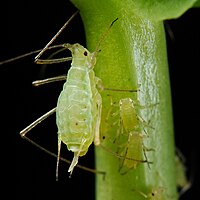
Adaptive population structure shifts in invasive parasitic mites, Varroa destructor
Sign Up to like & getrecommendations! Published in 2021 at "Ecology and Evolution"
DOI: 10.1002/ece3.7272
Abstract: Abstract Comparative studies of genetic diversity and population structure can shed light on the ecological and evolutionary factors governing host–parasite interactions. Even though invasive parasites are considered of major biological importance, little is known about… read more here.
Keywords: population; host; population structure; varroa destructor ... See more keywords

Significant transcriptional changes in mature daughter Varroa destructor mites during infestation of different developmental stages of honeybees.
Sign Up to like & getrecommendations! Published in 2020 at "Pest management science"
DOI: 10.1002/ps.5821
Abstract: BACKGROUND Varroa destructor is considered a major cause of honeybee (Apis mellifera) colony losses worldwide. Although V. destructor mites exhibit preference behavior for certain honeybee lifecycle stages, the mechanism underlying host finding and preference remains… read more here.
Keywords: infestation different; varroa; mature daughter; varroa destructor ... See more keywords

Testing new compounds for efficacy against Varroa destructor and safety to honey bees (Apis mellifera).
Sign Up to like & getrecommendations! Published in 2021 at "Pest management science"
DOI: 10.1002/ps.6617
Abstract: BACKGROUND Varroa destructor is among the greatest threats to honey bee health worldwide. Acaricides used to control Varroa are becoming increasingly ineffective due to resistance issues, prompting the need for new compounds that can be… read more here.
Keywords: varroa destructor; control; honey bees; varroa ... See more keywords

Miticidal activity of fenazaquin and fenpyroximate against Varroa destructor, an ectoparasite of Apis mellifera
Sign Up to like & getrecommendations! Published in 2022 at "Pest Management Science"
DOI: 10.1002/ps.6788
Abstract: Abstract BACKGROUND The Varroa mite (Varroa destructor) is an ectoparasite that can affect the health of honey bees (Apis mellifera) and contributes to the loss of colony productivity. The limited availability of Varroacides with different… read more here.
Keywords: varroa; fenpyroximate; varroa destructor; destructor ectoparasite ... See more keywords

Coexistence of genetically different Varroa destructor in Apis mellifera colonies
Sign Up to like & getrecommendations! Published in 2019 at "Experimental and Applied Acarology"
DOI: 10.1007/s10493-019-00395-z
Abstract: The aim of this study was to investigate the genetic diversity of Varroa destructor parasitizing Apis mellifera colonies and to test for possible host–parasite association at the mitochondrial DNA (mtDNA) level. Six A. mellifera haplotypes… read more here.
Keywords: apis mellifera; varroa destructor; destructor; mellifera colonies ... See more keywords

Beekeeper stewardship, colony loss, and Varroa destructor management
Sign Up to like & getrecommendations! Published in 2018 at "Ambio"
DOI: 10.1007/s13280-018-1130-z
Abstract: Varroa (Varroa destructor) is a leading cause of honey bee mortality worldwide. In a U.S. national survey of beekeepers, 3519 respondents noted what they believe are the advantages and disadvantages of managing for Varroa, what… read more here.
Keywords: beekeeper stewardship; varroa destructor; management; stewardship ... See more keywords

Varroa destructor: A Complex Parasite, Crippling Honey Bees Worldwide.
Sign Up to like & getrecommendations! Published in 2020 at "Trends in parasitology"
DOI: 10.1016/j.pt.2020.04.004
Abstract: The parasitic mite, Varroa destructor, has shaken the beekeeping and pollination industries since its spread from its native host, the Asian honey bee (Apis cerana), to the naïve European honey bee (Apis mellifera) used commercially… read more here.
Keywords: honey; destructor complex; honey bee; varroa destructor ... See more keywords

Environment or beekeeping management: What explains better the prevalence of honey bee colonies with high levels of Varroa destructor?
Sign Up to like & getrecommendations! Published in 2017 at "Research in veterinary science"
DOI: 10.1016/j.rvsc.2017.01.001
Abstract: Varroa destructor is one of the major threats to honey bee colonies. The mite abundance in the colonies is affected by environmental conditions as well as by beekeeping management. The aim of this study was… read more here.
Keywords: bee colonies; varroa destructor; destructor; beekeeping management ... See more keywords

Genome-wide identification of miRNAs and target regulatory network in the invasive ectoparasitic mite Varroa destructor.
Sign Up to like & getrecommendations! Published in 2021 at "Genomics"
DOI: 10.1016/j.ygeno.2021.05.028
Abstract: Varroa destructor is an ectoparasite mite that attacks bees leading to colony disorders worldwide. microRNAs (miRNAs) are key molecules used by eukaryotes to post-transcriptional control of gene expression. Nevertheless, still lack information about V. destructor… read more here.
Keywords: genome wide; wide identification; varroa destructor; destructor ... See more keywords

Recent spread of Varroa destructor virus-1, a honey bee pathogen, in the United States
Sign Up to like & getrecommendations! Published in 2017 at "Scientific Reports"
DOI: 10.1038/s41598-017-17802-3
Abstract: RNA viruses impact honey bee health and contribute to elevated colony loss rates worldwide. Deformed wing virus (DWV) and the closely related Varroa destructor virus-1 (VDV1), are the most widespread honey bee viruses. VDV1 is… read more here.
Keywords: destructor virus; honey; honey bee; varroa destructor ... See more keywords

Decreased Mite Reproduction to Select Varroa destructor (Acari: Varroidae) Resistant Honey Bees (Hymenoptera: Apidae): Limitations and Potential Methodological Improvements
Sign Up to like & getrecommendations! Published in 2022 at "Journal of Economic Entomology"
DOI: 10.1093/jee/toac022
Abstract: Abstract The invasive parasitic mite, Varroa destructor (Anderson and Trueman), is the major biotic threat to the survival of European honey bees, Apis mellifera L. To improve colony survival against V. destructor, the selection of… read more here.
Keywords: honey bees; decreased mite; mite reproduction; varroa destructor ... See more keywords